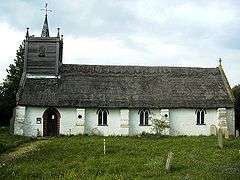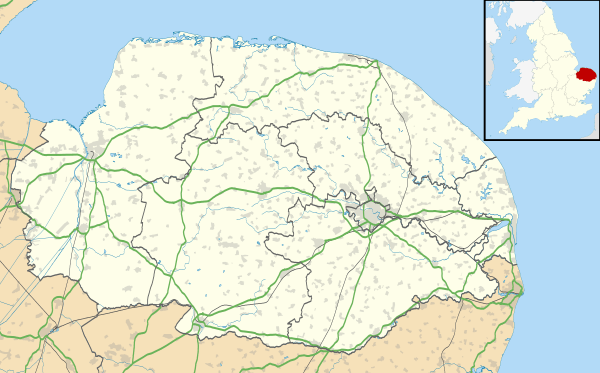Sisland
Sisland is a very small village, manor and parish in the county of Norfolk, England, about a mile west of Loddon. The Parish covers an area of 1.90 km2 (0.73 sq mi) and had a population of 44 in 16 households at the 2001 census.[1]
| Sisland | |
|---|---|
 Sisland St Mary | |
 Sisland Location within Norfolk | |
| Area | 1.90 km2 (0.73 sq mi) |
| Population | 44 |
| • Density | 23/km2 (60/sq mi) |
| OS grid reference | TM343985 |
| Civil parish |
|
| District | |
| Shire county | |
| Region | |
| Country | England |
| Sovereign state | United Kingdom |
| Post town | NORWICH |
| Postcode district | NR14 |
| Police | Norfolk |
| Fire | Norfolk |
| Ambulance | East of England |
Its church is dedicated to St Mary.
History of the Parish
History of the Manor
- In 1066 Ketil is recorded as Lord of the Manor of Sislanda. Ketil held many other manors some as Lord and others as Overlord.(Doomsday Phil. ref. 1,183)
- Godric the Steward is thought to have held Sislanda, together with other manors, for Ralph de Gael holder of the Breton Barony of Gael and Earl of the East Angles. Following the defeat of the Revolt of the Earls in 1075 by the forces of King William I of England, Ralph de Gael was stripped of his English titles privileges and lands, which returned to King William I of England, Godric then held Sislanda as Lord of the Manor.
- In 1086 Godric is recorded as Lord of the Manor of Sislanda, together with other manors.(Doomsday Phil. ref. 12,25)
- Godric named his first son Ralph.
- Ralph named his first son Gosceline.
- The following is extracted from "Topographical History of the County of Norfolk" published in 1809, Volume 10 pages 152-193 "the Hundred of Loddon".
Ralph de Lodne, with the consent of Gosceline, his son, gave by deed sans date to the nunnery of Wykes in Essex, with Beatrice his daughter, the tithe of his house and land at Preston in Suffolk: this was in the time of William (Turbe) Bishop of Norwich, as appears by the deed, and in the reign of Henry II of England.
Gosceline de Lodne, who was lord, dying left a son, Goscelin, who dying without issue, his five sisters were his heirs; Alicia, who married William de Beaucham; 2d, Agnes married William de Ryvill; 3d, Susan, married to Hugh de Somerton; 4th, Emma to Ralph de Hoo; and 5th, Lescilina, to Peter de Brokeley
Alicia, who married William Beauchamp, on a division of Goscelin's estate, had besides her own part the part of her sister Agnes, who with her husband, William de Ryvill, granted it to her, and her husband, William de Beauchamp.
The de Beauchamp family held the Manor of Sisland until John de Beauchamp, granted by fine, his interest in the Manor of Syseland and land in Lodne and the advowson of Lodne, to Edward, son of Sir William Charles, and Alice his wife.
"Sir William Charles had been granted the manor and advowson of Ketelburgh in Suffolk by Prince Edward who became Edward I. He built his manor house there in 1261 and established Kettleburgh as the family seat. The family of Charles lived in the manor house until 1507"
To this Edward Charles, and Alice his wife, Henry de Hales, and Trista de Ketelburgh surrender by fine, the manor of Milton in Northamptonshire: remainder to William Charles their son.
William, son of William Charles, was found to be lord of the Manor of Syseland in the reign of Edward II (1307-1327).
Edward Charles, is said to hold the Manor of Syseland in the reign of Edward III (1327-1377). Edward was his son and heir.
In 1400, Sir Robert Charles was lord of The Manor of Syseland and of Kettleburgh: in this year he died, and gives to Anne his wife, the lordships of Kettleburgh, Syseland, and Eston, with the advowson of Thweyte, paying 20/-. per ann. to Thomas, his eldest son, and she to have the education of his son Robert: his will is dated on the feast of St. Peter 1400, and he was buried in the chapel of Ketelburgh church, by the tomb of his father.
In 1420, the 7th of Henry V. Sir Thomas Charles, Knt. died, and Thomas was found to be his son and heir, aged 15:
In about 1432, about the 20th of Henry VI, this Thomas, and Elizabeth his wife, conveyed the manor of Syseland, with lands in Lodne, &c. to John Duke of Norfolk.
- During the time Sisland Manor was held by the Charles family it became known locally as the Manor of "Sisland otherwise Charles".
Notes
- "Sisland parish information". South Norfolk Council. 4 January 2006. Archived from the original on 15 November 2010. Retrieved 20 June 2009.
External links
![]()